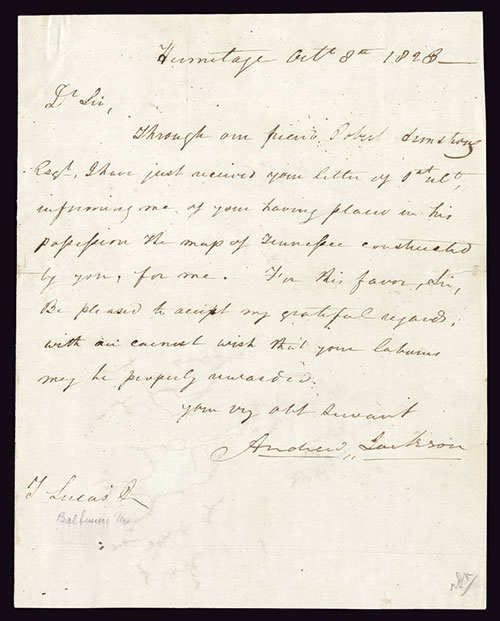
Auction: 318 - The Collector's Series
Lot: 1522
Jackson, Andrew. Seventh President of the United States (1829-1837), known as "Old Hickory" for his tough and aggressive personality (which included sundry duels), frontiersman, politician and army general - Jackson defeated the Creek Indians at the Battle of Horseshoe Bend (1814) and the British at the Battle of New Orleans (1815); a polarizing figure in politics, he dominated the Second Party System in the late 1820's and 1830's, a supporter of a smaller, more limited federal government, Jackson as president, strengthened the power of the office, dismantled the Second Bank of the U.S., and began the forced relocation and resettlement of Native American peoples from the Southeast to west of the Mississippi; while his protection of citizens' individual liberty is lauded in history, his support of slavery and pivotal role in the Indian removal is much criticized. Autograph Letter Signed "Andrew Jackson". One page, 7 5/8 x 9 5/8", Hermitage, October 8, 1828. Writing to Fielding Lucas, Jr., the famous cartographer in Baltimore, Jackson thanks him for "the map of Tennessee constructed by you for me." Jackson wrote this letter during the campaign for the Presidential Election of 1828, which was held Oct.31 to Dec. 2. The campaign, a rematch between incumbent John Quincy Adams and Andrew Jackson - runner-up in the previous election of 1824, was marked by a prodigious amount of mudslinging. In one vicious attack, Jackson's marriage came into question. When Jackson married his wife Rachel in 1791, the couple believed that she was divorced. Rachel's divorce, however, was not finalized, so Jackson had to re-marry her once the legal papers were complete. This was scandal fodder for the Adams campaigners. Charles Hammond, in his Cincinnati Gazette, asked "Ought a convicted adulteress and her paramour husband be placed in the highest offices of this free and Christian land?" Meanwhile, the notorious Coffin Handbills attacked Jackson for his court martial and execution of deserters, his massacres of Indian villages and his habit of dueling.
Throughout the campaign, Rachel Jackson suffered chest pains, becoming aggravated by the personal attacks on her marriage. She became ill and died on December 22, 1828. A grieving Jackson accused the Adams campaign, and Henry Clay even more so, of causing her death, decrying "I can and do forgive all my enemies. But those vile wretches who have slandered her must look to God for mercy."
When the results of the election were announced, a mob entered the White House, damaging the furniture and lights. Adams escaped through the back and large punch bowls were set up to lure the crowd outside. Conservatives were horrified by the event, and held it up as a portent of things to come from the first Democratic president. Jackson was sworn in on March 4, 1829.
The letter's recipient, Fielding Lucas, Jr. (1781-1854) is known as the earliest successful commercial map-publisher in Baltimore. The map of Tennessee to which Jackson refers was published by Lucas in 1827. Lucas founded `Lucas Bros. Inc. in 1804, becoming the first stationer in the U.S.
Trivial pressmarks and light crease lines. Written in a bold, strong hand. Fine. From the collection of Walter R. Benjamin (1854-1943) of NY, "the best autograph dealer in the U.S.," in the words of Richard Frajola, "since the 1920's and is the best pedigree you can have." (In 1887, Benjamin started the first shop dedicated to the sale of autographs and manuscripts in NY. The firm is still in business.) Accompanied by a blue folder with Benjamin collection label, and an 19th Century engraving of Jackson by V. Balch from a drawing by Longacre. [2]
Sold for
$3,200




